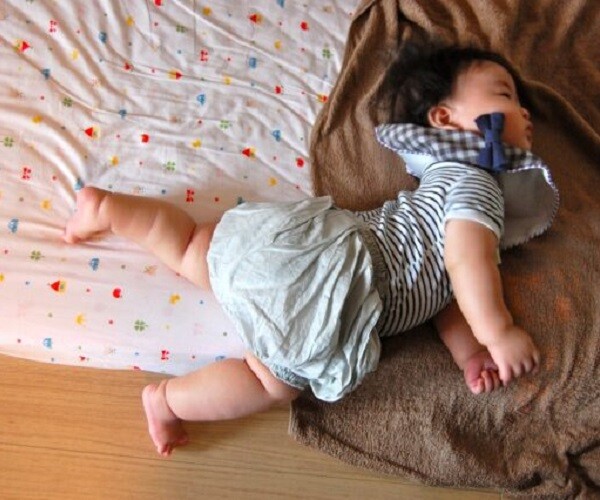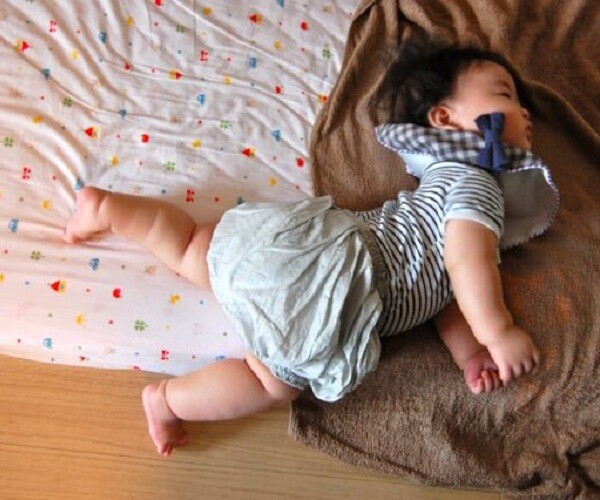These movements can indicate various things, from physical discomfort to emotions that the child cannot yet express verbally.


There can be several reasons why your child is tossing and turning in bed:
Your child may be feeling hot
Adults often worry about children catching a cold. During winter, we bundle them up in layers of clothing and thick blankets. Even in summer, we make sure they wear long sleeves and pants to bed. While this stems from a desire to protect them from the elements, sometimes our concerns can be excessive.
Children have a much faster metabolism and their bodies act like tiny furnaces. As a result, they tend to retain heat better than adults.
Children’s body temperatures are usually higher, and they generate heat quickly during activity. This means they can easily feel warmer in situations where adults feel comfortable.

Child tossing and turning in bed.
Their brain is still active
If your child has been very active before bedtime, or has watched exciting cartoons, their brain will be stimulated and they will naturally toss and turn. This excitement affects their emotions and has an impact on their heart rate and nervous system.
Just like our heart rate increases after running and needs time to calm down, your child’s brain needs time to “brake.”
Discomfort in the lower abdomen
A mother shared that her daughter often had trouble sleeping well. When the mother touched her daughter’s belly, it felt bloated and made noises when gently tapped.
It turned out that the little girl had been sneaking too many snacks, and then eating a large dinner. At bedtime, her stomach was still working overtime to digest all the food, causing discomfort.
If your child is experiencing digestive issues, they may have trouble sleeping and will instinctively try to relieve the discomfort by tossing and turning.

Too much playtime before bed can make it hard for children to fall asleep.
Seeking a sense of security from the parent
Many children, when sleeping, will feel insecure and unconsciously want to be close to their parent. This is a very natural phenomenon that reflects a deep-seated need for safety and a sense of protection.
Children tend to seek closeness with their parents, especially during sleep. When they are able to lie next to their mother, they feel a sense of peace and security, making it easier for them to fall asleep.

Understanding the signals and implementing these 4 tips can help your child sleep better:
When your child sends these signals, it’s important for parents to be understanding and quick to address the issue to improve their sleep quality.

Keep your child cool and comfortable
Don’t overdress your child for sleep. In summer, a short-sleeved onesie and a thin cotton blanket that’s lighter than the one you use should suffice.
Set the air conditioner to 24–26°C (75–79°F), and use a small fan on low speed to circulate the air.
Before bedtime, touch your child’s neck and palms. If they feel slightly damp, it means your child is a bit warm, so remove some clothing or the blanket.

Keep your child cool and comfortable.
Give their brain time to relax
About an hour before bedtime, avoid letting your child engage in too much play. Instead, give their brain time to unwind.
Read a picture book together in a cozy space, tell a short story in a soft voice, or sit quietly with your child on the bed and talk about pleasant things that happened during the day.
Let your child’s emotions gradually settle down and their brain relax, transitioning from an excited state to a sleepy one.
Ease the burden on their tummy
If your child has a late or very large dinner, their stomach will still be “working overtime” when it’s time to sleep.
Try to feed your child before 7 PM and avoid oily or hard-to-digest foods. If you notice your child has overeaten, gently rub their belly in a clockwise direction for 3–5 minutes after their bath to help their stomach and intestines move. Be gentle and ensure you don’t hurt your child.

Ease the burden on their tummy.
Provide a sense of security
When children are young, they are highly dependent on their mothers, so there’s no need to rush them into sleeping alone.
You can place a sidecar bed next to your larger bed.
Don’t sleep too far away from your child at night; let them feel your warmth and breath. When they are older and feel secure, you can consider having them sleep independently.
Young children can’t verbalize their discomfort, but they know how to use body language to communicate it. If your child is frequently tossing and turning in bed, don’t worry or get angry. First, consider whether they are feeling hot, overexcited, have a tummy ache, or miss you.
If you patiently observe and respond promptly, your child will sleep better, and you’ll have an easier time caring for them at night.
Whisper These 3 Magic Phrases to the Hotel Receptionist: Unbelievably Cheap, Gorgeous Rooms, and Amazing Deals!
“Did you know that a few well-chosen words can unlock a world of perks when checking into a hotel? It’s true – with the right phrases, you can gain access to a range of unexpected benefits without spending a cent. Imagine having the power to elevate your stay with just your words. It’s an art, a skill, and a secret weapon all rolled into one. So, get ready to transform your hotel experience with these three magic phrases.”






































